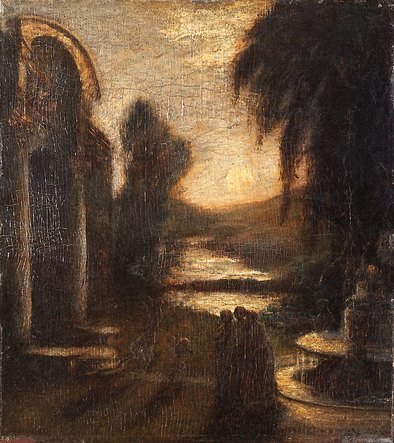Ryder's Temple of the mind / poe's "Haunted Palace"
 Albert Pinkham Ryder, The Temple of the Mind, Smithsonian American Art Museum
Albert Pinkham Ryder, The Temple of the Mind, Smithsonian American Art Museum
The Haunted Palace
(by Edgar Allan Poe)
In the greenest of our valleys
By good angels tenanted,
Once a fair and stately palace—
Radiant palace—reared its head.
In the monarch Thought’s dominion,
It stood there!
Never seraph spread a pinion
Over fabric half so fair!
Banners yellow, glorious, golden,
On its roof did float and flow
(This—all this—was in the olden
Time long ago)
And every gentle air that dallied,
In that sweet day,
Along the ramparts plumed and pallid,
A wingèd odor went away.
Wanderers in that happy valley,
Through two luminous windows, saw
Spirits moving musically
To a lute’s well-tunèd law,
Round about a throne where, sitting,
Porphyrogene!
In state his glory well befitting,
The ruler of the realm was seen.
And all with pearl and ruby glowing
Was the fair palace door,
Through which came flowing, flowing, flowing
And sparkling evermore,
A troop of Echoes, whose sweet duty
Was but to sing,
In voices of surpassing beauty,
The wit and wisdom of their king.
But evil things, in robes of sorrow,
Assailed the monarch’s high estate;
(Ah, let us mourn!—for never morrow
Shall dawn upon him, desolate!)
And round about his home the glory
That blushed and bloomed
Is but a dim-remembered story
Of the old time entombed.
And travellers, now, within that valley,
Through the red-litten windows see
Vast forms that move fantastically
To a discordant melody;
While, like a ghastly rapid river,
Through the pale door
A hideous throng rush out forever,
And laugh—but smile no more.
(by Edgar Allan Poe)
In the greenest of our valleys
By good angels tenanted,
Once a fair and stately palace—
Radiant palace—reared its head.
In the monarch Thought’s dominion,
It stood there!
Never seraph spread a pinion
Over fabric half so fair!
Banners yellow, glorious, golden,
On its roof did float and flow
(This—all this—was in the olden
Time long ago)
And every gentle air that dallied,
In that sweet day,
Along the ramparts plumed and pallid,
A wingèd odor went away.
Wanderers in that happy valley,
Through two luminous windows, saw
Spirits moving musically
To a lute’s well-tunèd law,
Round about a throne where, sitting,
Porphyrogene!
In state his glory well befitting,
The ruler of the realm was seen.
And all with pearl and ruby glowing
Was the fair palace door,
Through which came flowing, flowing, flowing
And sparkling evermore,
A troop of Echoes, whose sweet duty
Was but to sing,
In voices of surpassing beauty,
The wit and wisdom of their king.
But evil things, in robes of sorrow,
Assailed the monarch’s high estate;
(Ah, let us mourn!—for never morrow
Shall dawn upon him, desolate!)
And round about his home the glory
That blushed and bloomed
Is but a dim-remembered story
Of the old time entombed.
And travellers, now, within that valley,
Through the red-litten windows see
Vast forms that move fantastically
To a discordant melody;
While, like a ghastly rapid river,
Through the pale door
A hideous throng rush out forever,
And laugh—but smile no more.
Discussion points / questions / activities
- Ryder stated that he based his painting The Temple of the Mind on Poe's "The Haunted Palace," yet there are significant differences in the two. Compare and contrast the two works of art. What did Ryder take from Poe's poem, and what did he fashion from his own imagination?
- In what way does the painting (and poem) demonstrate tenets of Romanticism? Is one more 'Romantic' than the other? Why?
- Perhaps the similarity between the poem and the painting is not in subject matter, characters, or 'plot,' but rather, in the mood of the two pieces. What mood does Poe create in his poem (and what specific words does he use to bring about this mood?) What mood does Ryder create in his painting? In Ryder's case, the passage of time / erosion / cracking of the paint has given The Temple of the Mind a specific aura and atmosphere. How does the current physical state of the painting add (or detract) from the mood you think Ryder was trying to evoke?
- In Poe's story "Fall of the House of Usher," a character writes the poem The Haunted Palace. About that character, Poe states, "I mean to imply a mind haunted by phantoms — a disordered brain." In what way does the poem imply disorder? In what way does the painting imply disorder (consider the current physical state of the painting) and "a mind haunted by phantoms"?
REFERENCES
Poem: https://www.poetryfoundation.org/poems/52370/the-haunted-palace
Poem: https://www.poetryfoundation.org/poems/52370/the-haunted-palace
